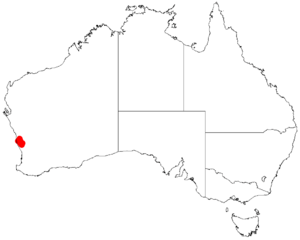Acacia epacantha facts for kids
Acacia epacantha is a special type of shrub. It belongs to the large Acacia family, also known as wattles. This plant is found only in a specific part of Australia. This means it is an endemic species, growing naturally nowhere else in the world.
Quick facts for kids Acacia epacantha |
|
|---|---|
| Conservation status | |
| Scientific classification |
|
| Kingdom: | Plantae |
| Clade: | Tracheophytes |
| Clade: | Angiosperms |
| Clade: | Eudicots |
| Clade: | Rosids |
| Order: | Fabales |
| Family: | Fabaceae |
| Clade: | Mimosoideae |
| Genus: | Acacia |
| Species: |
A. epacantha
|
| Binomial name | |
| Acacia epacantha Maslin
|
|
 |
|
| Occurrence data from AVH | |
| Script error: The function "autoWithCaption" does not exist. | |
Script error: No such module "Check for conflicting parameters".
What it Looks Like
This Acacia is a thick, bushy shrub. It has many spines, which are like sharp thorns. It usually grows to be about 0.2 to 0.5 meters (or 8 inches to 1.6 feet) tall. The plant spreads out, forming a wide shape.
Its small branches have spines that grow from the leaf axils. These spines are about 1 to 2 centimeters long. You will find one spine at each joint on the branch.
The leaves are very tiny. They have a single pair of pinnae, which are like small leaf branches. These are only 1 to 2 millimeters long. Each pinnae has two pairs of even smaller leaflets called pinnules. These pinnules are about 6 to 10 millimeters long and 0.7 to 1.5 millimeters wide.
This shrub produces bright yellow flowers. It blooms during the months of July and August.
How it Got its Name
The scientific name for this plant, Acacia epacantha, was first officially described in 1979. A botanist named Bruce Maslin gave it this name. He wrote about it in a scientific journal called Nuytsia.
Later, in 2003, another botanist named Leslie Pedley changed its name. He called it Racosperma epacanthum. However, in 2006, scientists decided to move it back to the Acacia group. So, its name became Acacia epacantha again.
Where it Grows
Acacia epacantha is native to the west coast of Western Australia. It grows in a specific area called the Wheatbelt region.
You can often find this plant growing in certain types of soil. It prefers gravelly soils that contain laterite. It also grows well in clay soils.


